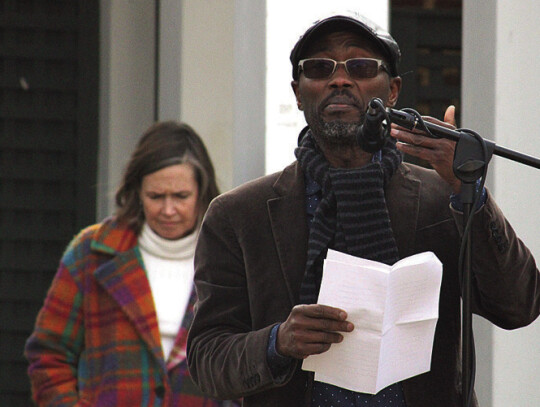Soft, mournful voices echoed throughout Hopkin’s Green as 40 community members sang “We Shall Overcome” on Saturday.
The song concluded a vigil for Tyre Nichols, a 29-year-old Black man who was brutally beaten by law enforcement in Memphis, Tenn.
Protests erupted across the nation on Jan. 27 after video footage of Nichols’ encounter with the Mem- phis police force was released. Locally, CARE (Community Anti-Racism Effort) Rockbridge responded with the vigil to remember Nichols and to call the Rockbridge community to action against racial injustice.
CARE Rockbridge President the Rev. Reginald Early started the ceremony with a moment of silence to remember the lost life of Tyre Nichols, followed by a statement released by the Black Lives Matter activist organization.
“Tyre should be alive today,” Early read. “… Tyre was overwhelmingly loved by his community, family, and friends … Today, our community is grieving another beautiful Black life stolen by state-sanctioned violence.”
To elaborate on the implications of Nichol’s death, Early invited local professors to speak.
Robin LeBlanc, a professor of politics at Washington and Lee University, attested to racially biased police brutality through statistics. She referenced Terry vs. Ohio, a Supreme Court case in 1968 that allows law enforcement to investigate suspicious behavior, or “stop and frisk” a person they suspect to be involved in a crime. LeBlanc believes that this essentially validates “wholesale violence against minority citizens.” Among other societal structures, she believes that this court case perpetuates a “power image” of law enforcement officers that use “bully activity” to maintain order.
LeBlanc demanded change within the judicial system. She demanded new laws for evidence and policing procedures. She urged the audience to ask law enforcement to stand with the BLM cause.
Another speaker, Mohamed Kamara, a French professor at W&L, agreed with LeBlanc that racism is integrated within society. Banning the police is just a temporary solution to a much greater problem, he said. The only way to fight systemic racism is to induce change in all aspects of life.
“Yes, we must change many things. We need to change the system that places Blacks at the bottom of everyone’s ladder,” Kamara said. “Let us teach our children from day one that women are not inferior to men, [and] that their gender or sexuality is neither inferior nor superior to anyone else. Let us teach our children that humanity is separate from what anyone chooses to practice or not practice. Let us teach our children that their race is neither the master race nor the slave race, [and] that the color of their skin should not be used against them. Yes, there are many things to change, and let us start today.”
Virginia Military Institute professor of economics Tinni Sen informed the audience of various local organizations and committees that are currently lacking participation. She implored the audience to involve themselves in local racial justice efforts.
“They say all politics are local politics. I say to you that all racial justice efforts are local efforts. It will take our hard labor to make sure that no more black or brown bodies are murdered, butchered, and cast aside,” Sen said. “Please hear my words as a call to action … Please engage and reengage with local racial justice efforts.”





